|
12/1/2023
Gender-based violence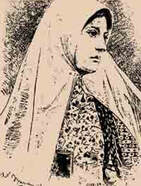 Táhirih (Ṭāhira) (Persian: طاهره, "The Pure One," also called Qurrat al-ʿAyn) Táhirih (Ṭāhira) (Persian: طاهره, "The Pure One," also called Qurrat al-ʿAyn) In 1848 in Persia, at a time where woman had to fully cover their hair and bodies, Tahirih – a well-known poet and intellectual, and the first female believer in the Baha’i dispensation – unveiled herself in a large gathering of men. This was a radical act that shook the people that were present and shocked the entire culture. Tahirih’s heroism represents the strong belief of Baha’is in the principle of the equality of women and men. Tahirih was thereafter put to death. Her last words were, “You can kill me as soon as you like, but you cannot stop the emancipation of women.  Over 200 million migrant workers sent US$554 billion back to their families in remittance-reliant countries in 2019. PHOTO:© IFAD Over 200 million migrant workers sent US$554 billion back to their families in remittance-reliant countries in 2019. PHOTO:© IFAD FAMILY LIFE AND CHILDREN The family unit is the nucleus of human society. It provides a vital setting for the development of praiseworthy qualities and capacities. Through its harmonious functioning and the development and maintenance of the bonds of love that join together its members, it gives constant expression to the truth that the well-being of the individual is inextricably bound to the progress and well-being of others. If love and agreement are manifest in a single family, that family will advance, become illumined and spiritual… — ‘ABDU’L-BAHÁ 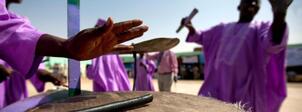 Members of the Falata community perform traditional dances at Al Zubir Stadium in El Fasher, North Darfur, as part of celebrations for United Nations Day. PHOTO:UN Photo/Albert Gonzalez Farran Members of the Falata community perform traditional dances at Al Zubir Stadium in El Fasher, North Darfur, as part of celebrations for United Nations Day. PHOTO:UN Photo/Albert Gonzalez Farran We all want happiness, for ourselves and for all our loved ones—but where does it really come from? When we interact with the ones we love we intuitively do our best to speak and act only in ways that would give rise to their well-being, peace, and feeling of security. Why? We know that doing otherwise would result in their discomfort—their unhappiness. On the basis of their love, parents make years of effort and sacrifice for the happiness of their children. Genuine public administrators and leaders, on the basis of the love they have for others and society, make efforts for the happiness of all those within their jurisdictions.  Both women and men working in natural resource sectors, such as agriculture, are likely to be affected by climate change. However, the impact is not the same and women's vulnerability stems from a number of factors -- social, economic and cultural. PHOTO:FAO/Mónica Castaño Both women and men working in natural resource sectors, such as agriculture, are likely to be affected by climate change. However, the impact is not the same and women's vulnerability stems from a number of factors -- social, economic and cultural. PHOTO:FAO/Mónica Castaño The Baha’i teachings on the equality of men and women have impelled the worldwide push for women’s rights forward even before it began as a social movement. Baha’u’llah, the founder of the Baha’i Faith, called for the equality of women and men as one of the foundational Baha’i principles; and did so in a dangerous Middle Eastern context in the 19th Century. The Ottoman Empire tortured, exiled and imprisoned him for life as a result. His son Abdu’l-Baha, the exemplar and inheritor of his father’s Cause, advocated globally for the rights of women long before it became safe or politically fashionable. Here, in excerpts from a speech Abdu’l-Baha gave to a women’s suffrage organization in New York City in May of 1912, Abdu’l-Baha calls for the equal rights of women in clear and emphatic terms:
19/2/2022
20th Feb- World Day of Social Justice : Creating Social Justice in Your Own Community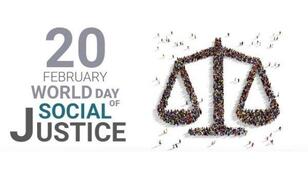 20th Feb. World Day of Social Justice 20th Feb. World Day of Social Justice The best place to start creating social justice is in your own community. We can each advocate for more justice in the wider world, but justice truly begins at home. For example, if you are young, you might begin by learning to accompany groups of pre-youth (11–14 years old) to strengthen their characters and help them discover the satisfaction that comes from acts of service to the community. Or perhaps you could organize a children’s class in your neighborhood to teach ethics and virtues to the next generation. The Baha’is have excellent training programs for both of these community-based social justice initiatives that have proven their worth around the world:  HEALTH CARE HEALTH CARE From a Baha’i viewpoint, true health extends beyond the physical. For an individual and a community to be healthy, emotional, intellectual, spiritual, and physical wellbeing are all required. As humanity’s understanding increases regarding the connection between the spiritual and emotional well-being of a patient and how this can affect their physical health, physicians and other health care providers will come to appreciate the benefit of understanding the beliefs and religious practices of their patients in order to provide optimal care for them.
18/1/2022
What Is World Religion Day?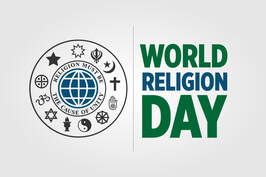 World Religion Day was initiated in 1950 by the National Spiritual Assembly of the Baha’is of the United States and it is often celebrated on the third Sunday of January. The day has been marked by hosting discussions, conferences, and other events which foster understanding and communication between the followers of all religions. Its purpose is to call attention to the harmony of spiritual principles and the oneness of the world’s religions and to emphasize that world religion is the motivating force for world unity. In many ways, celebrations in honor of World Religion Day strive to embody these words of Baha’u’llah:
19/12/2021
20 Dec- International Human Solidarity Day: Establish once for all the machinery that can make World unity a reality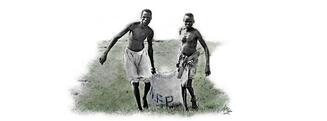 PHOTO:©Sadek Ahmed PHOTO:©Sadek Ahmed In his letter of 11 March, 1936, published under the title, “The Unfoldment of World Civilization”, Shoghi Effendi outlined a thrilling vision of the future of humankind, “a world civilization such as no mortal eye hath ever beheld or human mind conceived.” “Unification of the whole of mankind is the hall-mark of the stage which human society is now approaching,” “he wrote. “Unity of family, of tribe, of city-state, and nation have been successively attempted and fully established. World unity is the goal towards which a harassed humanity is striving.”  "All Human, All Equal" is this year's slogan for Human Rights Day. "All Human, All Equal" is this year's slogan for Human Rights Day. On December 10, the world commemorates Human Rights Day to honor the anniversary of the adoption of the Universal Declaration of Human Rights by the United Nations General Assembly on December 10, 1948. This is an appropriate time, then, to reflect on the concept of human rights from a Baha’i perspective. Baha’u’llah said: “Ye are the fruits of one tree, and the leaves of one branch. Deal ye one with another with the utmost love and harmony.” And He declared: “The earth is but one country, and mankind its citizens.”  The classroom in the Kamurasi Demonstration School in Masindi Municipality, Uganda, with the Ugandan Sign language alphabet draw on the wall. PHOTO:UNICEF/Uganda/Barbeyrac The classroom in the Kamurasi Demonstration School in Masindi Municipality, Uganda, with the Ugandan Sign language alphabet draw on the wall. PHOTO:UNICEF/Uganda/Barbeyrac Bahá'í writings speak explicitly about disability. "The whole duty of man in this Day is to attain that share of the flood of grace which God poureth forth for him. Let no one, therefore, consider the largeness or smallness of the receptacle. The portion of some might lie in the palm of a man's hand, the portion of others might fill a cup, and of others even a gallon-measure." Gleanings from the Writings of Bahá'u'lláh The implication of this passage, could be that whatever we are given (physically, intellectually, spiritually) the important thing is that we seek to fill the receptacle - however large or small that may be. Perhaps first we should examine what we mean by disability. Disability may be visible or invisible; physical, mental or spiritual. 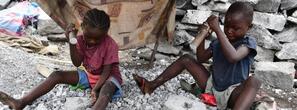 Children work at a granite mine in Burkina Faso in 2020. UNICEF is working to withdraw and educate children aged 3 to 12 and place young people aged 14 to 17 in training. PHOTO:UNICEF/Frank Dejongh Children work at a granite mine in Burkina Faso in 2020. UNICEF is working to withdraw and educate children aged 3 to 12 and place young people aged 14 to 17 in training. PHOTO:UNICEF/Frank Dejongh There are few concepts more anathema to the Baha’i Faith than slavery. It offends a long list of Baha’i sensibilities as well as the Faith’s express tenets – from the equality of the races, to the importance of the family unit, to the equality of the sexes, and the general advancement of human rights. Remembering historical slavery is vital. And it is important to understand that no population has had a monopoly on either side of this shameful institution; virtually every population at various points in history has been both enslaved and has either held or traded slaves.
26/11/2021
‘ABDU’L‑BAHÁ – THE PERFECT EXEMPLAR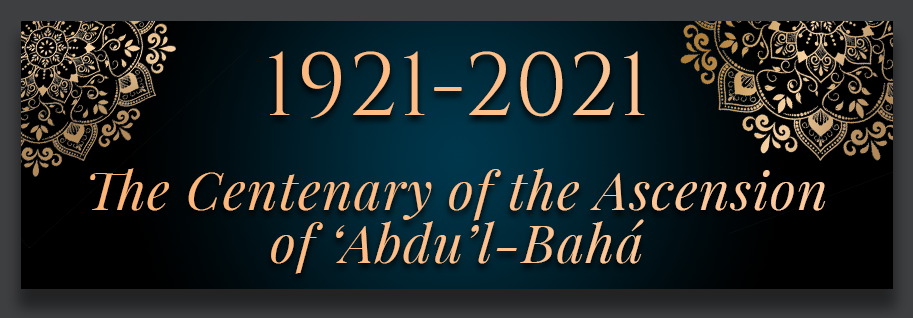 In the early years of the 20th century, ‘Abdu’l-Bahá—the eldest Son of Bahá’u’lláh—was the Bahá’í Faith’s leading exponent, renowned as a champion of social justice and an ambassador for international peace. Upholding unity as the fundamental principle of His teachings, Bahá’u’lláh established the necessary safeguard to ensure that His religion would never suffer the same fate as others that split into sects after the deaths of their Founders. In His Writings, He instructed all to turn to His eldest Son, ‘Abdu’l-Bahá, not only as the authorized interpreter of the Bahá’í Writings but also as the perfect exemplar of the Faith’s spirit and teachings.
26/11/2021
25 Nov- International Day for the Elimination of Violence against Women: UNITE TO END GENDER BASED VIOLENCE Another future without violence against women is possible with education, essential services across policing, justice, health, and social sectors, and sufficient financing dedicated to women’s rights. PHOTO:UN Women Another future without violence against women is possible with education, essential services across policing, justice, health, and social sectors, and sufficient financing dedicated to women’s rights. PHOTO:UN Women The United Nations reports that violence against women is the most extreme form of discrimination in the world. A few days ago on 25th November was the International Day for the Elimination of Violence against Women. If you’re a man, the Baha’i teachings ask you to never use force against a woman or a girl: For a man to use force to impose his will on a woman is a serious transgression of the Baha’i Teachings. – The Universal House of Justice, 24 January 1993, Violence Against Women, Sexual Abuse.  Students at the “25 de Junho” School, located in Beira, Mozambique. PHOTO:UN Photo/Eskinder Debebe Students at the “25 de Junho” School, located in Beira, Mozambique. PHOTO:UN Photo/Eskinder Debebe The family unit is the nucleus of human society. It provides a vital setting for the development of praiseworthy qualities and capacities. Through its harmonious functioning and the development and maintenance of the bonds of love that join together its members, it gives constant expression to the truth that the well-being of the individual is inextricably bound to the progress and well-being of others. A fundamental role of the family is to raise children who can assume responsibility for both their own spiritual growth and their participation in the advancement of civilization. 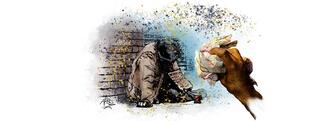 PHOTO:©Sadek Ahmed PHOTO:©Sadek Ahmed Almost half of the world’s people live on less than two dollars a day. But more than one billion people – about a fifth of the earth’s population – subsist in extreme poverty, living on less than a dollar a day. Because of those tragic facts, this week people around the world will observe two important U.N.-designated days – United Nations World Food Day on October 16th; and the International Day for the Eradication of Poverty on October 17th. These two observances recognize the critical importance of lifting the severe burdens of hunger and extreme poverty:  19-year-old South African girl Sebabatso Ncephe (left) developed an app – Afya Yangu, or "My Health" in Swahili. By allowing hospitals to directly communicate with patients, the app helps patients maintain privacy and dignity. PHOTO:UNICEF/Mosibudi Ratlebjane 19-year-old South African girl Sebabatso Ncephe (left) developed an app – Afya Yangu, or "My Health" in Swahili. By allowing hospitals to directly communicate with patients, the app helps patients maintain privacy and dignity. PHOTO:UNICEF/Mosibudi Ratlebjane Empowering Girls The Baha'i International Community was particularly pleased that the girl child was identified in the Beijing Platform for Action as a critical area of concern. Baha'is have long been active in efforts to address the developmental needs of girls so that they will be able, as women, to contribute fully to the advancement of civilization. Indeed, the Baha'i Writings promise that "when women participate fully and equally in the affairs of the world, when they enter confidently and capably the great arena of laws and politics war will cease."
9/10/2021
10th OCT- World Mental Health Day 10 October is World Mental Health Day 10 October is World Mental Health Day How Religion Helps Us Cope With Mental Health Challenges Religion and medicine have been intertwined throughout history, especially in Eastern countries. During the past 30 years there has been growing interest in and research studies have been conducted on the relationship between religion and spirituality and mental health. Findings have shown, for the most part, that religion has a positive effect on well-being and mental health.
4/10/2021
World Teacher’s DayWere there no educator, all souls would remain savage, and were it not for the teacher, the children would be ignorant creatures. `Abdu'l-Baha 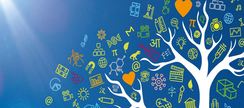 World Teachers' Day World Teachers' Day Station of the Teacher The importance and high regard afforded teachers is expressed in several ways in the Bahd'I writings. The teacher is the only non-relative that is to be included in the list of persons to receive inheritance. The teachers have a high station and a high calling. They are to be knowledgable in their subjects taught and in pedagogy, and to be distinguished in character and conduct.  The Peace Bell was donated by the United Nations Association of Japan in 1954. It has become tradition to ring the bell twice a year: on the first day of spring, at the Vernal Equinox, and on 21 September to celebrate the International Day for Peace. PHOTO:UN Photo/Manuel Elías The Peace Bell was donated by the United Nations Association of Japan in 1954. It has become tradition to ring the bell twice a year: on the first day of spring, at the Vernal Equinox, and on 21 September to celebrate the International Day for Peace. PHOTO:UN Photo/Manuel Elías World peace, Baha’is believe, is not a naïve dream, not some vague, pious hope, not even an option—world peace is inevitable: The Great Peace towards which people of good will throughout the centuries have inclined their hearts, of which seers and poets for countless generations have expressed their vision, and for which from age to age the sacred scriptures of mankind have constantly held the promise, is now at long last within the reach of the nations. For the first time in history it is possible for everyone to view the entire planet, with all its myriad diversified peoples, in one perspective. World peace is not only possible but inevitable. It is the next stage in the evolution of this planet – in the words of one great thinker, “the planetization of mankind”. – The Universal House of Justice, The Promise of World Peace, p. 1.  One of three adult literacy classrooms in Gao, Mali constructed and equipped by the UN Multidimensional Integrated Stabilization Mission in Mali (MINUSMA). PHOTO:UN Photo/Harandane Dicko One of three adult literacy classrooms in Gao, Mali constructed and equipped by the UN Multidimensional Integrated Stabilization Mission in Mali (MINUSMA). PHOTO:UN Photo/Harandane Dicko The seventh Ishráq of Baháʼu'lláh's Ishráqat stipulates as follows "Unto every father hath been enjoined the instruction of his son and daughter in the art of reading and writing... " While there do exist a number of preliterate or non-literate cultures, Baháʼís assume the spread of literacy to be one of the signs of an "ever-advancing civilization." For example, a priesthood is not needed in this era because the ability to read and write is no longer restricted to a professional class, with the masses reduced to auditors of their sacred texts.  Christiana, Angélica, and Delza at a UNICEF-assisted organization in Brazil, which empowers black youth to confront racism and advocates for equal education and work opportunities. PHOTO:UNICEF/Alejandro Balaguer Christiana, Angélica, and Delza at a UNICEF-assisted organization in Brazil, which empowers black youth to confront racism and advocates for equal education and work opportunities. PHOTO:UNICEF/Alejandro Balaguer Centering the “Pupil of the Eye”: Blackness, Modernity, and the Revelation of Bahá’u’lláh In the late nineteenth century, Bahá’u’lláh likened people of African descent to the “pupil of the eye” through which the “light of the spirit shineth forth.” This selection of metaphor, often referred to by Central Figures and Institutions of the Bahá’í Faith, effectively positions blackness at the epicenter of a “bold and universal” world-transformative project that involves nothing less than the “coming of age of the entire human race” (Shoghi Effendi, World Order 43, 163).
21/8/2021
22 August | Human Rights Related to Freedom of Religion or Belief | International Day Commemorating the Victims of Acts of Violence Based on Religion or Belief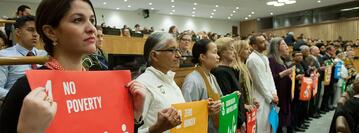 Participants at event on “Interfaith harmony: Implementing the Transformative Agenda of the Sustainable Development Goals”, co-organized by the United Nations Alliance of Civilizations (UNAOC) and the Committee of Religious NGOs (2016). PHOTO:UN Photo/Manuel Elias Participants at event on “Interfaith harmony: Implementing the Transformative Agenda of the Sustainable Development Goals”, co-organized by the United Nations Alliance of Civilizations (UNAOC) and the Committee of Religious NGOs (2016). PHOTO:UN Photo/Manuel Elias Freedom of religion or belief, freedom of opinion and expression, the right to peaceful assembly and the right to freedom of association are interdependent, interrelated and mutually reinforcing. They are enshrined in articles 18, 19 and 20 of the Universal Declaration of Human Rights. Upholding these rights plays an important role in the fight against all forms of intolerance and of discrimination based on religion or belief.
18/8/2021
19 August- World Humanitarian Day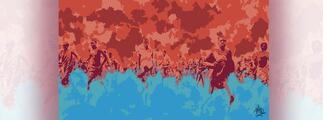 "The Human Race", an illustration depicting human figures running while consumed by shades of red (global warming) and shades of blue (tsunami as a climate change phenomenon). PHOTO:©Sadek Ahmed "The Human Race", an illustration depicting human figures running while consumed by shades of red (global warming) and shades of blue (tsunami as a climate change phenomenon). PHOTO:©Sadek Ahmed In countless places we don’t usually hear about around the world, humanitarian aid workers labor every day to assist people who need help. Have you ever traveled somewhere solely to help others? That’s what international humanitarian aid workers do. They heroically go into dangerous places where people’s lives are at risk, and they selflessly put their own lives at risk to help others. Far away from their families and their home countries, most international humanitarian aid workers put themselves in harm’s way because they feel a strong sense of the oneness of humanity.  A centuries-old marginalization and a set of different vulnerabilities expose indigenous peoples to the serious effects of the COVID-19 pandemic. PHOTO:UN Composition with photographs by PAHO (left), Martine Perret (center) and UNICEF Ecuador-Arcos (right) A centuries-old marginalization and a set of different vulnerabilities expose indigenous peoples to the serious effects of the COVID-19 pandemic. PHOTO:UN Composition with photographs by PAHO (left), Martine Perret (center) and UNICEF Ecuador-Arcos (right) CLOSING THE GAP AND OVERCOMING INDIGENOUS DISADVANTAGE The lifetime expectancy gap between indigenous and non-indigenous is but a symptom of a greater, multi-dimensional problem. The Bahá’í Community recognises that a great deal of work must be carried out to right wrongs, to create justice, and to educate a new generation. Instant solutions are not possible. Education, however, provides a long-term solution to indigenous disadvantage, by creating a shift in consciousness within the next generation of, both indigenous and non-indigenous.
23/7/2021
The Power of Prayer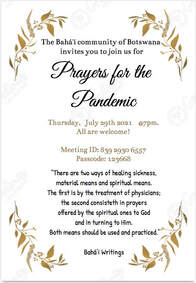 The prayer day in Botswana for Covid 19 on July 29th The prayer day in Botswana for Covid 19 on July 29th Remembrance of God is like the rain and dew which bestow freshness and grace on flowers and hyacinths, revive them and cause them to acquire fragrance, redolence and renewed charm. “And thou hast seen the earth dried up and barren: but when We send down the rain upon it, it stirreth and swelleth, and groweth every kind of luxuriant herb.” Strive thou, then, to praise and glorify God by night and by day, that thou mayest attain infinite freshness and beauty. (‘Abdu’l-Bahá, from a Tablet—translated from the Persian) |
Bahá’ís of BotswanaBahá’í communities are working together with their neighbours and friends to promote and contribute to the well-being and progress of society. In urban centres and rural villages, in homes and schools, citizens of all backgrounds, classes and ages are participating in a dynamic pattern of life, taking part in activities which are, at once, spiritual, social and educational. Archives
January 2023
Categories |
FOR MORE INFORMATION
|
|
 RSS Feed
RSS Feed